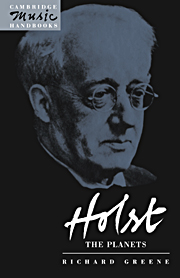3 - Reception
Published online by Cambridge University Press: 21 November 2009
Summary
It is hard today to imagine the impact of the language of The Planets on its original audience. While a good deal of Europe's avant-garde music was being gradually introduced in London, British taste was still polarized between the nineteenth-century classics on the one hand, and simple entertainment styles on the other. Part of the success of the suite must be attributed to the variety of language from one movement to the next. Yet a study of the reviews of various performances suggests that it was not until the suite was heard in its entirety that it was so widely acclaimed. Also to be considered is the reception of The Hymn of Jesus, which was certainly as enthusiastic and as wide ranging as that of the suite. Perhaps the most important point is that, unlike most compositions, The Planets was introduced over a two-year period, and by 1920 many of the movements were “like old friends,” as claimed by L. Dunton Green in the Arts Gazette (29 November 1919). This reviewer was clearly on Holst's side, and early on had written about how disturbed he was that the suite was not being played in its complete form. “It was an injustice to the composer to rob his planetary system of the two stars whose soft light would have relieved the fierce glare of the five others” (Arts Gazette, 8 March 1919).
- Type
- Chapter
- Information
- Holst: The Planets , pp. 30 - 39Publisher: Cambridge University PressPrint publication year: 1995



